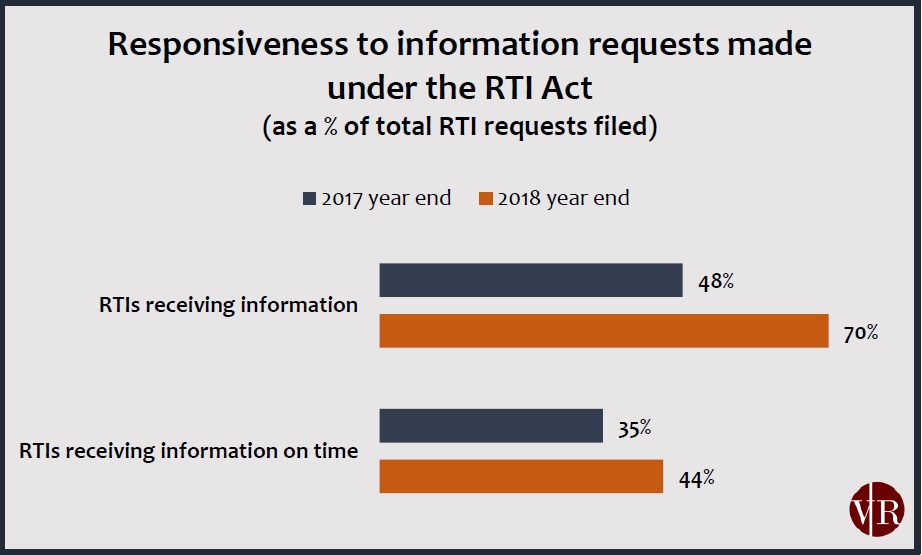The paucity of information on the use of public funds in Sri Lanka has typically impeded the public from holding the government accountable for its spending. The lack of visibility tends to leave mismanagement, poor planning and a lack of accountability undetected, which has resulted in the poor implementation of budget proposals in each budget cycle.
A key milestone in tackling this problem was the introduction of the Right to Information (RTI) Act, No. 12 of 2016. The Act came into effect on 3 February 2017, and grants Sri Lankan citizens the right to access information in the possession, custody or control of public authorities.
Also, the budget monitoring platform BudgetPromises.Org was introduced by Verité Research with the aim of bridging this information gap. The platform monitors and reports on the progress of expenditure proposals listed in the annual budget speech valued over LKR 1 billion. To date, it has tracked the implementation of budget proposals in the 2017 and 2018 budget speeches. The platform seeks to answer two questions in relation to expenditure proposals: 1) is the government doing what it is saying, and 2) is the government saying what it is doing? By making this information available to the public in a simple and clear manner, BudgetPromises.Org attempts to hold government institutions accountable for the expenditure of public money.
Access to information unlocked through RTI
The monitoring of the progress of budget proposal implementation by a third-party organisation and reporting of the findings on an online public platform such as BudgetPromises.Org is a new concept in Sri Lanka. Thus, during the first year, obtaining information from government agencies was a significant challenge.
Verité Research (VR) used three methods to obtain information to track budget implementation progress: reviewing government websites, visiting government agencies, and filing RTI requests under the RTI Act. In the first year—when assessing the 2017 budget proposals—only limited information could be accessed through websites and by visiting government agencies. Therefore, when the RTI Act came into effect in 2017 it became highly instrumental in accessing information. Of the 37 proposals tracked by VR in 2017, it was possible to access the necessary information to assess the year-end progress for 33 proposals. For 76% of these 33 proposals, the information to assess progress was obtained through responses to RTI requests.
By the second year of the assessment, BudgetPromises.Org was an established and recognized platform, especially among the relevant government agencies that were being monitored. Thus, it was significantly easier to access implementation-related information for the 2018 budget proposals by visiting the government agencies. Of the 38 proposals tracked for 2018, VR was able to access information to track the year-end progress of 28 proposals. Despite the relative openness of government agencies compared to the first year, RTI continued to be an important tool to access information in the second year, with 42% of the proposals requiring RTI responses to assess progress.
Improvements in RTI responses
The shift towards greater openness by public authorities in the second year compared to the first year was also reflected in the timeliness of the responses received to RTI requests. As per the RTI Act, information from government agencies should be provided within 28 working days of the request being acknowledged, unless an extension is requested with justification. As shown in Figure 1 below, the percentage of RTI requests in response to which information was provided, and the number of such responses that came on time (in line with provisions in the Act) increased between 2017 and 2018.

Greater openness as a catalyst for change
By making budget implementation information accessible to the public, BudgetPromises.Org has been able to shift public focus from ‘promise making’, i.e. where the government informs the public of what they propose to do with the public’s money, to ‘promise keeping’, i.e. whether they actually implemented what they proposed. The information gathered by the platform has been useful to assess progress, and to identify the reasons for government falling behind its implementation targets.
BudgetPromises.Org’s findings helped shift public focus to aspects of government budgeting that are critical to enhancing budget credibility but previously did not garner much attention. Parliamentary discussions following the 2019 Budget Speech also saw members of the opposition questioning the feasibility of new proposals in light of the poor progress made on its 2018 proposals. In response to public criticism of weak progress, the Ministry of Finance proposed in 2017 to establish a Monitoring Unit to track progress internally. In 2019, the Minister of Finance announced plans to set up six committees to track different aspects of budget implementation.
Areas for improvement
Proactive disclosure
Information disclosure by public institutions is either reactive or proactive. Responding to RTI requests filed under the RTI Act is reactive disclosure, where information is provided only upon request. By contrast, proactive disclosure is when a public institution makes public information easily accessible by either publishing it online or at the physical premises of the institution. The RTI Act advocates proactive disclosure by agencies to foster a culture of accountability. The requirements for proactive disclosure are set out under Sections 8 and 9 of the RTI Act, and Regulation No. 20 under the Act. Thus, the information required by BudgetPromises.Org to assess progress should, in fact, be proactively disclosed by government agencies. However, the information available on the websites of the respective agencies remains very low, compelling the BudgetPromises.Org platform to rely heavily on formal RTI requests to obtain the necessary information. Therefore, to create greater transparency and credibility around government budgets, higher levels of online proactive disclosure by government agencies are necessary.
Published Date: October 18, 2019

